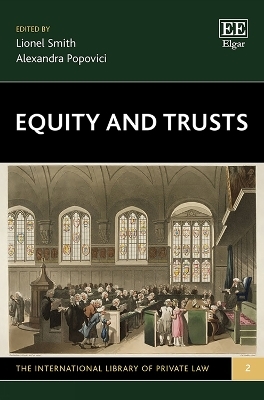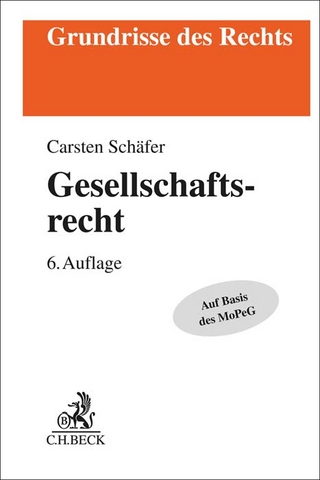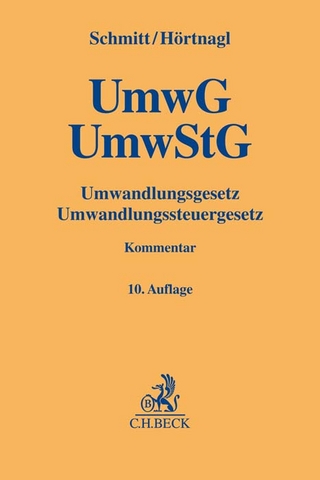
Equity and Trusts
Edward Elgar Publishing Ltd (Verlag)
978-1-78811-108-9 (ISBN)
This review discusses the most important and influential papers in the field of Equity and Trusts. While taking seriously the intimate and historical relationship between English Equity and the law of trusts, it also addresses new and comparative perspectives on the subject, bringing together common law and civil law, doctrinal scholarship and socio-legal analysis, historical approaches to Equity and functional ones. The review includes a wide range of authors and outlooks ranging from Frederic Maitland to recent material on fiduciary obligations and discretionary trusts, highlighting the universality of Equity as a body of law, and the nature of the Trust as a fundamental juristic institution. This literary piece promises to be a useful tool for academics captivated by this subject area.
Edited by Lionel Smith, Gonville & Caius College, University of Cambridge, UK and Alexandra Popovici, Professor and Director of the Common Law and Transnational Law Programs, Faculty of Law, Sherbrooke University, Canada
Contents:
Introduction Lionel Smith and Alexandra Popovici
PART IEQUITY
1. Frederic William Maitland ([1909] 1929), ‘Lectures I and II: The Origins of Equity’, in A.H. Chaytor and W.J. Whittaker (eds), Equity – Also The Forms of Action at Common Law: Two Courses of Lectures, Cambridge, UK: Cambridge University Press, 1–11, 12–22
2. Paul D. Finn (1989), ‘The Fiduciary Principle’, in T. G. Youdan (ed.), Equity, Fiduciaries and Trusts, Chapter 1, Carswell, Toronto, Canada: Law Book Company, 1–56
3. Bernard Rudden (1992), ‘Equity as Alibi’, in Stephen Goldstein (ed.), Equity and Contemporary Legal Developments, Jerusalem, Israel: Hebrew University of Jerusalem, 30–45
4. Sarah Worthington (1999), ‘Fiduciaries: When is Self-Denial Obligatory?’, Cambridge Law Journal, 58 (3), November, 500–08[9]
5. Steven B. Elliott and Charles Mitchell (2004), ‘Remedies for Dishonest Assistance’, Modern Law Review, 67 (1), January, 16–47
6. Joshua Getzler (2006), ‘Rumford Market and the Genesis of Fiduciary Obligations’, in Andrew Burrows and Lord Rodger of Earlsferry (eds), Mapping the Law: Essays in Memory of Peter Birks, Chapter 31, Oxford, UK and New York, NY, USA: Oxford University Press, 577–98
7. Maurizio Lupoi (2009), ‘”Trust and Confidence”’, Law Quarterly Review, 125, April, 253–87
8. Charles Mitchell (2013), ‘Equitable Compensation for Breach of Fiduciary Duty’, Current Legal Problems, 66 (1), January, 307–39
9. Andrew Kull (2014), ‘Ponzi, Property, and Luck’, Iowa Law Review, 100 (3), March, 291–322
10. Paul B. Miller (2014), ‘The Fiduciary Relationship’, in Andrew S. Gold and Paul B. Miller (eds), Philosophical Foundations of Fiduciary Law, Chapter 3, Oxford, UK and New York, NY, USA: Oxford University Press, 63–90
11. Irit Samet (2016), ‘Fiduciary Law as Equity’s Child’, in Paul B. Miller and Andrew S. Gold (eds), Contract, Status, and Fiduciary Law, Chapter 6, Oxford, UK and New York, NY, USA: Oxford University Press, 139–66
12. Remus Valsan (2016), ‘Fiduciary Duties, Conflict of Interest, and Proper Exercise of Judgment’, McGill Law Journal, 62 (1), September, 1–40
13. Henry E. Smith (2017), ‘Fusing the Equitable Function in Private Law’, in Kit Barker, Karen Fairweather and Ross Grantham (eds), Private Law in the 21st Century, Chapter 9, Oxford, UK, Portland, Oregon, USA: Hart Publishing, 173–95
PART IITRUSTS
14. Frederic William Maitland ([1909] 1929), ‘Lecture III: Uses and Trusts’, in A.H. Chaytor and W.J. Whittaker (eds), Equity – Also The Forms of Action at Common Law: Two Courses of Lectures, Cambridge, UK: Cambridge University Press, 23–42
15. Joseph R. Long (1922), ‘The Definition of a Trust’, Virginia Law Review, 8 (6), April, 426–33
16. D.W.M. Waters (1967), ‘The Nature of the Trusts Beneficiary’s Interest’, Canadian Bar Review, 45 (2), March, 219–83
17. Roger Cotterrell (1987), ‘Power, Property and the Law of Trusts: A Partial Agenda for Critical Legal Scholarship’, Journal of Law and Society, 14 (1), Spring, 77–90
18. David Hayton (1996), ‘The Irreducible Core Content of Trusteeship’, in A. J. Oakley (ed.), Trends in Contemporary Trust Law, Chapter 3, Oxford, UK and New York, NY, USA: Oxford University Press, 47–62
19. George L. Gretton (2000), ‘Trusts Without Equity’, International and Comparative Law Quarterly, 49 (3), July, 599–620
20. Robert Chambers (2002), ‘Liability’, in Peter Birks and Arianna Pretto (eds), Breach of Trust, Chapter 1, Oxford, UK, Portland, Oregon, USA: Hart Publishing, 1–40
21. Paul Matthews (2002), ‘From Obligation to Property, and Back Again? The Future of Non-Charitable Purpose Trust ’, in David Hayton (ed.), Extending the Boundaries of Trusts and Similar Ring-Fenced Funds, The Hague, the Netherlands: Kluwer Law International, 203–41
22. Tony Honoré (2003), ‘Trusts: The Inessentials’, in Joshua Getzler (ed.), Rationalizing Property, Equity and Trusts: Essays in Honour of Edward Burn, Chapter 1, London, UK: LexisNexis Butterworths, 7–20
23. John H. Langbein (2004), ‘Mandatory Rules in the Law of Trusts’, Northwestern University Law Review, 98 (3), March, 1105–27
24. Paul Matthews (2006), ‘The Comparative Importance of the Rule in Saunders v. Vautier’, Law Quarterly Review, 122, April, 266–94
25. Lionel D. Smith (2008), ‘Trust and Patrimony’, Revue Générale de Droit, 38 (2), November, 379–403
26. Ben McFarlane and Robert Stevens (2010), ‘The Nature of Equitable Property’, Journal of Equity, 4, March, 1–28
27. Lusina Ho (2013), ‘Trusts: The Essentials’, in Lionel Smith (ed.), The Worlds of the Trust, Chapter 2, Cambridge, UK: Cambridge University Press, 1–20
28. J.E. Penner (2014), ‘Distinguishing Fiduciary, Trust, and Accounting Relationships’, Journal of Equity, 8, 202–34
29. Alexandra Popovici (2015), ‘Trusting Patrimonies’, in Remus Valsan (ed.), Trusts and Patrimonies, Chapter 9, Edinburgh, UK: Edinburgh University Press, 199–220
30. Robert Chambers (2016), ‘The End of Knowing Receipt’, Canadian Journal of Comparative and Contemporary Law, 2 (1), March, 1–32
31. Ying Khai Liew (2016), ‘Reanalysing Institutional and Remedial Constructive Trusts’, Cambridge Law Journal, 75 (3), November, 528–49
32. Alexandra Braun (2017), ‘The State of the Art of Comparative Research in the Area of Trusts’, in Michele Graziadei and Lionel Smith (eds), Comparative Property Law: Global Perspectives, Chapter 6, Cheltenham, UK and Northampton, MA, USA: Edward Elgar Publishing, 121–49
33. John Mee (2017), ‘The Past, Present, and Future of Resulting Trusts’, Current Legal Problems, 70 (1), December, 189–225
34. Lionel Smith (2017), ‘Massively Discretionary Trusts’, Current Legal Problems, 70 (1), December, 17–54
Index
| Erscheinungsdatum | 22.11.2019 |
|---|---|
| Reihe/Serie | The International Library of Private Law |
| Verlagsort | Cheltenham |
| Sprache | englisch |
| Maße | 169 x 244 mm |
| Themenwelt | Sonstiges ► Geschenkbücher |
| Recht / Steuern ► EU / Internationales Recht | |
| Recht / Steuern ► Wirtschaftsrecht ► Gesellschaftsrecht | |
| Recht / Steuern ► Wirtschaftsrecht ► Handelsrecht | |
| ISBN-10 | 1-78811-108-7 / 1788111087 |
| ISBN-13 | 978-1-78811-108-9 / 9781788111089 |
| Zustand | Neuware |
| Haben Sie eine Frage zum Produkt? |
aus dem Bereich


